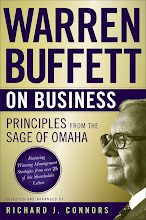In today's New York Times, it was reported that Credit Suisse will "radically change the way it paid its employees."
"The Credit Suisse plan will cover roughly 2,000 employees in the United States. Top executives will receive a greater portion of their total compensation in the form of their monthly cash salaries, while bonuses will be split evenly between cash and stock.
The stock will vest over four years, and the cash portion will pay out in three. But both components will be adjusted based on the bank's performance over that period, with a particular emphasis on its return on equity, a closely-watched financial measure. The performance of an executive's business will also be taken into account."
________________________________________________
Graham Bowley, Credit Suisse Overhauls Compensation, New York Times, October 21, 2009
Contrast this plan with that of Warren Buffett's long-time incentive compensation system for Berkshire Hathaway executives. No compensation plan consultants need apply.
"At Berkshire....I am a one man compensation committee who determines the salaries for the CEOs of around 40 significant operating businesses. How much time does this aspect of my job take? Virtually none. How many CEO's have voluntarily left us for other jobs in our 42-year history? Precisely none."
___________________________________________
Warren Buffett, 2006 Letter to Berkshire Hathaway Shareholders
"At Berkshire, we want to have compensation policies that are both easy to understand and in sync with what we wish our associates to accomplish."
_____________________________________________
Warren Buffett, 1999 Letter to Berkshire Hathaway Shareholders
"At Berkshire, however, we use an incentive compensation system that rewards key managers for meeting targets in their own baliwicks. If See's does well, that does not produce incentive compensation at the News-nor visa versa. Neither do we look at the price of Berkshire stock when we write bonus checks. We believe good unit performance should be rewarded whether Berkshire stock rises, falls, or stays even. Similarly, we think average performance should earn no special rewards even if our stock should soar.
The rewards that go with this system can be large.....We do not put a cap on bonuses, and the potential for rewards is not hierarchical. The manager of a relatively small unit can earn far more than the manager of a larger unit if results indicate he should. We believe, further, that such factors as seniority and age should not effect incentive compensation (though they sometimes influence basic compensation). A 20-year old who can hit .300 is as valuable as a 40- year old performing as well."
_______________________________________________
Warren Buffett, 1985 Letter to Berkshire Hathaway Shareholders
When we use incentives-and these can be very large-they are always tied to the operating results for which a given CEO has authority. We have no lottery tickets that carry payoffs unrelated to business performance. If a CEO bats .300, he gets paid for being a .300 hitter, even if circumstances outside of his control cause Berkshire to perform poorly. And if he bats .150, he doesn't get a payoff just because the successes of others have enabled Berkshire to prosper mightily. An example: We now own $61 billion of equities at Berkshire, whose value can easily rise or fall by 10% in a given year. Why in the world should the pay of our operating executives be affected by such $6 billion swings, however important the gain or loss may be for shareholders?
________________________________________________
Warren Buffett, 2006 Letter to Berkshire Hathaway Sharehoders





No comments:
Post a Comment